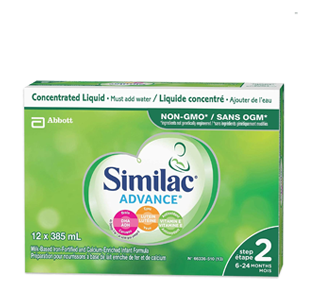Wise choices, every step of the way
The first years of a child's life are marked by many firsts and transitions : first smile, first full night's sleep, first laugh, first words, and first steps. As he/she discovers the world, Baby offers the gift of his/her small exploits to enchanted parents. "He's growing so fast!" they'll say, with a mixture of pride and nostalgia.
Transitions are also part of a baby's nutrition process. All caring parents will stay attentive and mindful of offering their little one the best nutrition possible, according to the baby's age and health, while respecting their own convictions. Here is some information to help you make these transitions wisely.
From breastfeeding—to infant formula
Health Canada, Canadian Paediatric Society, and Dietitians of Canada recommend exclusive breastfeeding for the first six months, and continued breastfeeding until at least two years of age, accompanied by adequate complementary foods. In fact, the medical community recognizes that breast milk constitutes the best source of nutrition for babies.
For various reasons (personal convictions, convenience, difficulties during breastfeeding, etc.), some parents choose infant formula after birth or in the months that follow. These parents can rest assured, since infant formula is specially formulated to provide babies with all of the nutritional elements necessary for optimal development and good health.
From one infant formula—to another
Commercially prepared cow's milk formulas are suitable for most healthy term newborns. Homemade preparations must absolutely be avoided, as they cannot replace breast milk. It is sometimes necessary to change formulas along the way, for various reasons. Here are a few of them:
- personal or religious beliefs
- problems with constipation, intestinal gas, regurgitation or irritability
- allergy or intolerance to cow's milk protein or to lactose
Iron content can vary from one infant formula to another. At the beginning of a baby's life, he/she needs an iron-fortified formula (until 9 to 12 months of age), in order to prevent an iron deficiency.
Ask your pharmacist to help you choose the formula best-suited to your child's particular needs.
From an exclusive liquid diet—to solid foods
At six months of age, it is time to consider adding solid foods, including iron-rich foods, to fulfill the child's energy and nutrient needs. When Baby begins to eat, a drink of water can be offered. Juice is not a good choice of beverage for young children.
Milk is still very important during this period. A baby can be given a follow-up formula, which is formulated to provide a greater amount of nutrients and an increased caloric intake. This formula is designed to promote growth and fulfill the nutritional needs of babies between the ages of 6 and 24 months. Some contain a blend of DHA, lutein and Vitamin E, nutrients that promote the baby's health and development, and do not contain any GMOs.
Cow's milk is not recommended before the age of 9 to 12 months.


